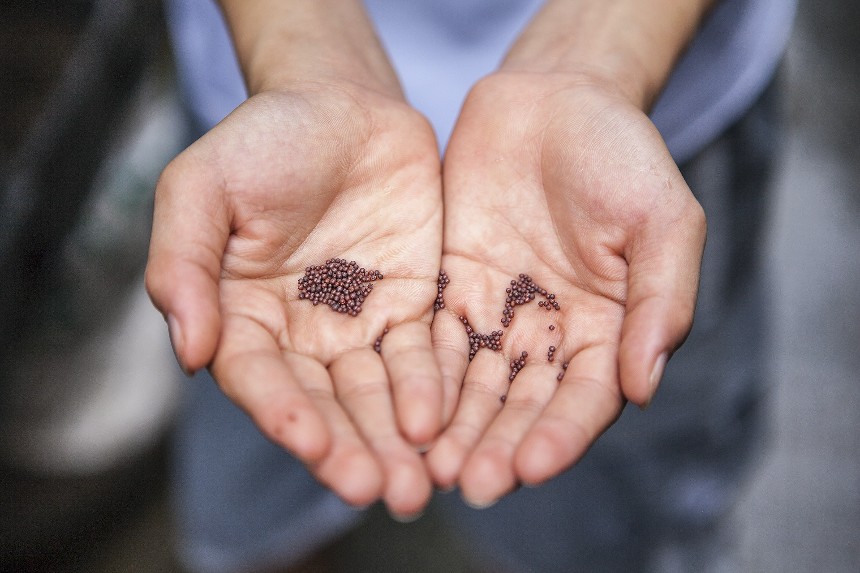
Planting season has started on the homestead. As I’ve worked my way through the garden beds, burying seeds in the soil, I’ve been struck by two things.
First, it’s incredible to me how small some of them are! A “large” seed might be the size of the end of one’s pinky finger. A green bean would be an example of this. However, cabbage seeds are the size of the period at the end of this sentence. The idea that a four-pound head of cabbage could come from such a tiny seed is incredible to me.
On the other hand, it’s jaw-dropping to think about how many seeds must be planted for a garden to grow. During the growing season, hundreds of seeds will be buried and nurtured in my garden’s soil to provide the beans, radishes, potatoes, and so on, which will feed my family through the winter.
More than that, thousands upon thousands of seeds will be planted by the commercial farmers who live around me so that families across the country will have food for their dinner tables. The act of placing tiny seeds in the soil over and over again results in full bellies and happy lives for everyone.
I’ve thought about this as it relates to our walk as Buddhists. As Westerners, we’re taught that life is all about grand gestures and quick results. We’re trained to “go big or go home.” We expect tectonic shifts to take place in the world due to singular actions.
But that’s not how life works.
Large vegetables come from small seeds, and big life changes come from small shifts in behavior. More than that, it’s rarely enough to do a thing just one time, even if we do it perfectly. In the same way that we must plant countless seeds to grow a garden, we must engage in healthy, life-affirming actions countless times to grow a happy life.
This is why Buddhist practice stresses consistency over perfection. Each time we chant, meditate, or bow in front of our altar, we plant a seed. and as we continue to plant those seeds day after day, we grow a garden of enlightenment.
But that can’t happen if we’re not willing to put in the work.
Similarly, when we talk about our daily lives, there is nothing glamorous about feeding our pets, mowing our lawns, or folding our laundry. And if we think of these tasks as drudgery that we must endure or avoid at all costs, we suffer. However, if we see them as seeds with the potential to grow a happy, fulfilled life for us to enjoy, they become a source of pleasure and satisfaction.
Like a wise gardener we must choose our seeds carefully and dedicate ourselves to planting more of them each day. It is this consistency of effort that allows our enlightenment to grow. Additionally, we must make good choices regarding what seeds we choose to plant. It is a foolish gardener who plants apple seeds in the hope of growing a tomato plant.

Similarly, if our actions sow the seeds of greed, anger, and ignorance into our daily lives, we shouldn’t be surprised if the results are not what we desire. Instead, we must ensure that our actions are in accordance with Buddhist doctrine; that we hold to the Four Noble Truths, the Noble Eight-fold Path, the Six Perfections, and the four Brahmaviharas.
When we do this we take hold of virtuous seeds such as compassion, equanimity, loving-kindness, and sympathetic joy, and we plant them in the soil of our lives. We do this each time we are kind to our neighbor, each time we our loving toward our partner. And each time we go out of our way to assist someone who needs help, we are nurturing the seeds of the Dharma.
And as they grow into the garden of our enlightenment, it becomes easier to plant more seeds, which benefit not only ourselves but others as well. Thus, the planting of spiritual seeds, much like the planting of vegetable seeds, leads to a healthy, life-affirming cycle that is helpful to everyone who takes part.
That said, when we think of the number of seeds that must be planted to grow a garden, it can be overwhelming. When we think about the amount of physical and spiritual seeds that must be grown, it can be disheartening.
We may think that the work can never be completed, so we refuse to try. In these moments, it’s important to remember that we cannot fill a garden bed with seeds unless we start by filling it with one. And if we only plant a single seed, it can still grow into nourishing food for ourselves and for others in the same way that a single cabbage seed can grow into a four-pound head of cabbage.
We don’t need to plant the whole garden. We don’t need to make everything right. We just need to plant a single seed and nurture it until it grows.
Namu Amida Butsu
Related features from BDG
How the Magic Works
Planting the Seeds of Enlightenment
Sowing the Seeds of Metta to Dissolve Fears of the Unknown
The Language of Kindness
A Humanitarian Action for Other Living Beings: Creating Space for Urban Biodiversity through Buddhist Gardening
Planting Seeds of Understanding












